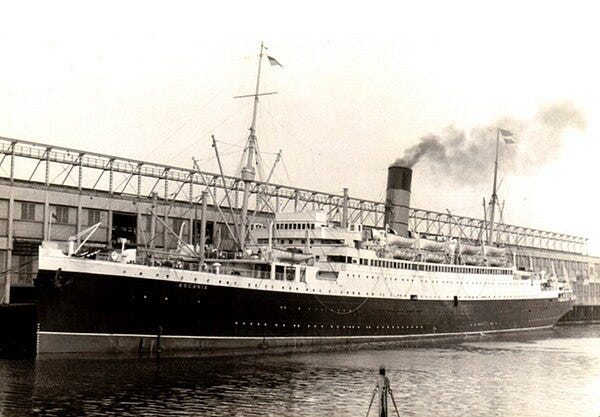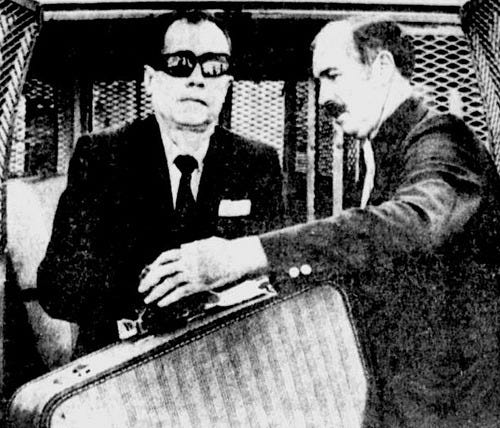Toronto, October 13, 2024
Ticket to ride
Looking forward to getting on that airplane?
Recreational travel is a great pleasure of middle class life. It’s a way of breaking the tedious quotidian routine, getting away from it all, seeing new sights, experiencing the exotic, learning stuff, e.g., about the Mayans, Antarctica or Vermeer. Old people with time and money on their hands, people like me who once couldn’t afford to take a taxi across town, talk in their dotage about elaborate travel across continents. Oh yes, they say, now that we are retired we can follow the Silk Road or visit Machu Picchu or see a live volcano or go to the phallological museum in Reykjavik. We’ve always wanted to do those things and now we can. Obituaries list the travel exploits of the deceased: “He was an intrepid voyager. He visited six of the world’s seven continents. He canoed the Nahanni. And he went to the phallological museum in Reykjavik.”
Yes, we all like to travel, particularly we elderly. Or do we?
I was ten in October 1954 when I crossed the Atlantic on the Royal Mail Ship Ascania, a 14,000 ton Cunard passenger liner, on my way as an immigrant to Canada from England. In 1965 I crossed the Atlantic in the opposite direction on the RMS Carinthia to attend an English university. My first trip on an airplane was in 1962, when I was 17, on a Trans-Canada Airlines DC-8 from Winnipeg to Montreal. I vividly remember my excitement when the big jet roared down the runway on takeoff.
By God, wasn’t travel fun in those days! In 1948 BOAC introduced a thrice-weekly flying boat service from the UK to Johannesburg. The route was Southampton-Augusta-Cairo-Luxor-Khartoum-Port Bell-Victoria Falls-Vaaldam. The trip took five days. Elaborate on-board full-course meals were served. Women passengers wore white gloves and hats. Every night the passengers disembarked and were taken to a luxury hotel. I once visited one of these hotels, the Victoria Falls Hotel on the Zambezi River in what is now Zimbabwe. I had lunch in an elegant dining room dominated by a picture of King Edward VII.
All that’s over now. Regular transatlantic passenger shipping came to an end in the early 1970s. The commercial flying boat service to Johannesburg ended in 1950. Air travel is now tedious and commonplace. Jet planes are commuter buses in the sky. Airports are chaotic cauldrons of bureaucratic suspicion and bungling centred around the absurd and meaningless theatre of screening and security. Much of the blame for airport unfriendliness belongs to Antulio Ramirez Ortiz. On May 1961, Ortiz hijacked a National Airlines flight from Miami to Cuba, ushering in a wave of similar hijackings that led to the introduction of increasingly onerous airport security measures. In an ironic denouement, in 1972 Ortiz tried unsuccessfully to flee Cuba on a raft.
And yet we do travel, if we have the time and the money. I myself have itchy feet. But with itchy feet comes travellers’ remorse. Two or three days before a trip, faced with so many things to think about and organize, confronted with the uncertainties of travel, imagining everything that could go wrong, conjuring up the horrors of the airport, I say to myself: Why am I doing this? I have a comfortable home. Why abandon it for the unknown and perilous? What happens if I fall ill while I’m away? Why not just stay put, sustained by claret and Netflix?
But once the taxi leaves for the airport, the doubts drop away, replaced by excitement of the kind I felt in 1962 when that TCA DC-8 thundered down the Winnipeg airport runway bound for Montreal.
Note to readers: There won’t be an Endgame next Sunday. I’ve got a ticket to ride.
*****
Some reader comments on Newsletter #83 (“Meanderings on the body, brain and mind”)
From my severest critic: “Sunday 6 a.m. reading about Descartes! As a kid you must have been exasperating... One happy thought, in your list of medical specialists there are at least two I have not encountered.”
A regular reader writes: “Thanks for your usual blend of candour and reflection—really laying Descartes on de table. The endless body maintenance and tune-ups required as we age, where being able to fog a mirror means we are still under warranty, are indeed a contrast to the mindless/thoughtless abandon with which our bodies hurtled through our youth. But who had the time for this anyway when we were gainfully employed? As for your question of ‘where will it all end?’, spoiler alert. Meantime, live it up!”
David Wolinsky comments: “I am in Connecticut for a family event. It’s 8 a.m. local time and 5 a.m. West Coast time which still governs my body. I’m seated in the hotel restaurant enjoying the buffet breakfast after my second visit to the food station. I’ve been enjoying reading your current column on my iPhone, and although my brain has undoubtedly warned me about the various specialists I’ll be obliged to visit when I return home as a result of my indulgences at the unlimited buffet, fortunately my mind still permits me to roam untrammelled over the various items I may have missed and I don’t believe will restrict me from a third visit back to the buffet. The mind is indeed a wonderful thing.”
From an old friend: “I am thinking that you are preoccupied with the disadvantages of growing old (or maybe I should say, growing older). Yes, our bodies remind us of the years behind us, but we should rejoice that we are still ambulatory, and fully cognitive, even at our advanced ages!!!! Be positive. Start celebrating. Just think: we get discounts on the TTC, at the movies, at the dentist, and probably many more places.”
From a constant reader: “Particularly liked your closing sentences, ‘As we get old, the brain increasingly deals with the decrepitude of the body, and starts itself to fail. But the mind, separate from the brain and apart from the body, can roam untrammelled until the end. Part of us remains forever free,’ which reminded me of The Diving Bell and the Butterfly.”
And finally, this encouraging comment: “You do write extraordinarily well for one so old.”







Yeah, yeah, yeah. The mind is free and all that. The trouble is, it's attached to the body. Last 'Endgame' I was in the hospital feeling unable to read anything. Now I'm eagerly waiting for my discharge (on a Sunday, good luck) enjoying Philip's extraordinary writing skills and writing my own jumbled comment, mainly because there is nothing quite as boring as a hospital bed when you're feeling fine. My wife and I can't travel any more and you know what? It's not so bad!
PS When I was an undergraduate philosophy student my response to Descartes was "l think I think, therefore I think I am."
Samuel Pepys wrote, "Continue to question your certitudes and continue to refine your opinions toward their essences, you can maintain an elegant mind." I think of Mr. Slayton in this regard.
'The Endgame'. allows Mr. Slayton to be a public diarist of great honesty. Some of us travel
widely without much money, even in our advanced age. I think of Edward Lear: "Here in
Corsica, my resources are meager but not the imagination." Even at his most formal, Mr. Slayton speaks as if we are sitting across the kitchen table from each other.